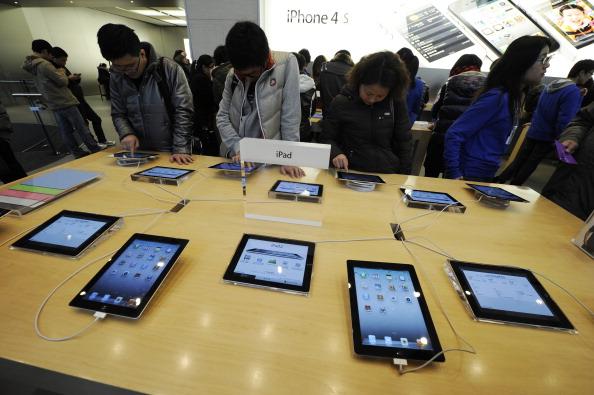Besides battling the economic climate, the eminent issue that plagues popular high-end brand names is any threat to its exclusivity and any counterfeit items. One way to maintain this exclusivity is to shift marketing campaigns to electronic solutions be it on the Internet or mobile phone platforms, following the general business trend.
Luxury branded products have taken a beating during the global financial crises. For instance it was a challenging year for the European luxury brand who owns Dom Perignon champagne and Hennessy Cognac, with a reported 14 percent drop in 2009 profit according to Bloomberg amid a world recession and soft demands for high end cognac and champagne. LVMH Chairman Bernard Arnault said at a recent press conference, “2010 will remain a difficult year, but the trend is improving.”
The recent Reuters Global Luxury Summit that has drawn international companies where senior executives from design houses and prestigious store chains brainstorm and network about business trends and strategy.
The Web interface may not have been the obvious alternative to traditional marketing channels like magazines and television once upon a time, but it has evolved to become an inevitable solution.
If you had asked me two years ago, I would have said there is no way we are going to have any sort of evening clothes business online,” said Alexander Bolen, chief executive of U.S-based fashion house Oscar de la Renta according to Reuters.
“I was totally wrong about that. I have been totally shocked at the sort of business we have done online.”
Other high-end branded companies such as the popular French fashion label Lacoste modified their complete budget from conventional channels to be all online since October 2009. Others have followed a similar direction including the world’s second largest jewelry retailer Tiffany & Co., Ralph Lauren clothing, and the Estée Lauder makeup brand, which have made major developments to shift consumers to the online marketplace and/or mobile phone methodology.
Luxury firms are essentially riding the wave of social networking sites like Facebook and Twitter where a loyal following creates interactivity with obvious benefits like word-of-mouth and statistics producing marketing results.
“The Internet is becoming more important—not so much to sell (products), but as a communication tool,” said Francesco Trapani in an interview with Reuters. Trapani is the chief executive of the Italian jewelry, watches and perfume group Bulgari, which is the world’s third-largest jeweler.
Face to face contact and tactile approach still has a role to play when it comes to the luxury goods market.
Patek Philippe watches which start from $12,300 per item can be priced up to $1 million.
“When you buy a Patek Philippe, you need to feel and touch it and you need good advice. Patek Philippe is not only about business but also about passion. If I sell online, I'll lose that,” said Thierry Stern, chief executive of one of the very few remaining family-owned Swiss watchmakers.
Overall, most eyes are on Asia, Trapani told reporters that he expects, “Europe [to have] a medium-term period during which things will be difficult. ... We are pushing growth in Asia because it is in Asia we are seeing the growth.” However the weaker euro has some immediate rewards for consumers.
“The euro weakness is a great thing for luxury goods companies. In fact, their costs are typically in euros, and their revenues are split between U.S. dollars, yen, and euros,” said Luca Solca, an analyst at Bernstein to Reuters.
Tourists would be likely attracted to shopping capitals in Europe such as Milan, Paris, and London with the more advantageous exchange rates.
“When an American comes to the Cote d'Azur, he will find that the watches are not so expensive anymore,” Jean-Claude Biver, chief executive of LVMH’s (LVMH.PA) Hublot watch brand, told the Reuters Global Luxury Summit in Paris.
Luxury branded products have taken a beating during the global financial crises. For instance it was a challenging year for the European luxury brand who owns Dom Perignon champagne and Hennessy Cognac, with a reported 14 percent drop in 2009 profit according to Bloomberg amid a world recession and soft demands for high end cognac and champagne. LVMH Chairman Bernard Arnault said at a recent press conference, “2010 will remain a difficult year, but the trend is improving.”
The recent Reuters Global Luxury Summit that has drawn international companies where senior executives from design houses and prestigious store chains brainstorm and network about business trends and strategy.
The Web interface may not have been the obvious alternative to traditional marketing channels like magazines and television once upon a time, but it has evolved to become an inevitable solution.
If you had asked me two years ago, I would have said there is no way we are going to have any sort of evening clothes business online,” said Alexander Bolen, chief executive of U.S-based fashion house Oscar de la Renta according to Reuters.
“I was totally wrong about that. I have been totally shocked at the sort of business we have done online.”
Other high-end branded companies such as the popular French fashion label Lacoste modified their complete budget from conventional channels to be all online since October 2009. Others have followed a similar direction including the world’s second largest jewelry retailer Tiffany & Co., Ralph Lauren clothing, and the Estée Lauder makeup brand, which have made major developments to shift consumers to the online marketplace and/or mobile phone methodology.
Luxury firms are essentially riding the wave of social networking sites like Facebook and Twitter where a loyal following creates interactivity with obvious benefits like word-of-mouth and statistics producing marketing results.
“The Internet is becoming more important—not so much to sell (products), but as a communication tool,” said Francesco Trapani in an interview with Reuters. Trapani is the chief executive of the Italian jewelry, watches and perfume group Bulgari, which is the world’s third-largest jeweler.
Face to face contact and tactile approach still has a role to play when it comes to the luxury goods market.
Patek Philippe watches which start from $12,300 per item can be priced up to $1 million.
“When you buy a Patek Philippe, you need to feel and touch it and you need good advice. Patek Philippe is not only about business but also about passion. If I sell online, I'll lose that,” said Thierry Stern, chief executive of one of the very few remaining family-owned Swiss watchmakers.
Overall, most eyes are on Asia, Trapani told reporters that he expects, “Europe [to have] a medium-term period during which things will be difficult. ... We are pushing growth in Asia because it is in Asia we are seeing the growth.” However the weaker euro has some immediate rewards for consumers.
“The euro weakness is a great thing for luxury goods companies. In fact, their costs are typically in euros, and their revenues are split between U.S. dollars, yen, and euros,” said Luca Solca, an analyst at Bernstein to Reuters.
Tourists would be likely attracted to shopping capitals in Europe such as Milan, Paris, and London with the more advantageous exchange rates.
“When an American comes to the Cote d'Azur, he will find that the watches are not so expensive anymore,” Jean-Claude Biver, chief executive of LVMH’s (LVMH.PA) Hublot watch brand, told the Reuters Global Luxury Summit in Paris.




